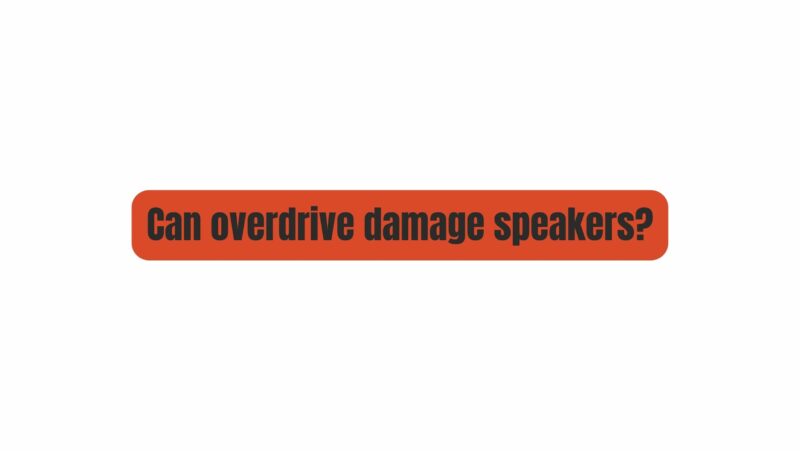Speakers play a pivotal role in delivering audio experiences across various settings, from home entertainment systems to concert venues. However, their ability to reproduce sound faithfully is not limitless. One common concern among audio enthusiasts and professionals is whether overdriving speakers can lead to damage. In this comprehensive article, we will delve into the world of overdriving speakers, discussing what overdrive means, the potential risks involved, and the measures you can take to safeguard your speakers.
Understanding Overdrive
Before we can explore the impact of overdrive on speakers, it’s essential to grasp what overdrive actually means in the context of audio equipment. Overdrive occurs when a speaker is subjected to a power input that exceeds its designated specifications or recommended limits. This excess power input can manifest in several ways:
- Excessive Volume: Overdriving often involves turning the volume up to levels that push the speaker to its limits or beyond. This can lead to audible distortion, which is characterized by a harsh, unpleasant sound.
- Clipping: Overdrive can cause the audio signal to clip, which means the tops and bottoms of the waveform are cut off or flattened. Clipping results in the generation of harmonics and can severely impact audio quality.
- Increased Heat: Overdriving a speaker results in the conversion of more electrical energy into heat within the voice coil and other internal components. This can cause the speaker to overheat, potentially leading to permanent damage.
The Impact of Overdrive on Speakers
Now that we have a basic understanding of overdrive, let’s delve into how it can affect speakers. Overdrive can have various consequences on speaker components and performance:
- Voice Coil Damage: Overdriving a speaker can cause the voice coil to heat up excessively. Prolonged exposure to high temperatures can lead to the voice coil’s insulation breaking down, resulting in a short circuit. This can render the speaker inoperable and necessitate costly repairs or replacement.
- Mechanical Stress: Overdrive can place significant mechanical stress on a speaker’s components, including the diaphragm, cone, and suspension. This stress can cause physical damage, such as tears in the diaphragm or separation of the suspension components.
- Reduced Lifespan: Continuously subjecting a speaker to overdrive can significantly reduce its lifespan. Even if the speaker doesn’t fail immediately, its performance may deteriorate over time, resulting in a noticeable decrease in sound quality.
Preventing Speaker Damage from Overdrive
To protect your speakers from damage due to overdrive, consider implementing the following precautions:
- Match Amplifier and Speaker Ratings: Ensure that the amplifier you use is well-matched to your speaker’s specifications. Using an amplifier with a power output within the speaker’s recommended range reduces the risk of overdrive-related damage.
- Use a Limiter: Consider using a limiter or compressor in your audio signal chain. These devices can help prevent excessive peaks in the audio signal that may lead to overdrive.
- Monitor Volume Levels: Pay close attention to the volume levels when listening to music or using audio equipment. Avoid turning the volume up to levels where distortion becomes noticeable, as this is a sign of potential overdrive.
- Quality Audio Sources: Utilize high-quality audio sources and recordings. Poorly encoded or highly compressed audio files can introduce distortion and increase the likelihood of overdrive.
- Regular Maintenance: Periodically inspect your speakers for any signs of damage or wear. Early detection of issues can prevent them from worsening and causing further damage.
Conclusion
In conclusion, overdriving speakers can indeed lead to damage if not managed carefully. Whether you’re an audio enthusiast or a professional, it’s crucial to understand the relationship between overdrive and speaker health. By following the precautions outlined in this article, such as using appropriate amplifiers, monitoring volume levels, and employing signal processing tools, you can enjoy your audio equipment to the fullest while minimizing the risk of overdrive-related damage. Remember that protecting your speakers from overdrive not only ensures their longevity but also preserves the quality of your audio experiences.


